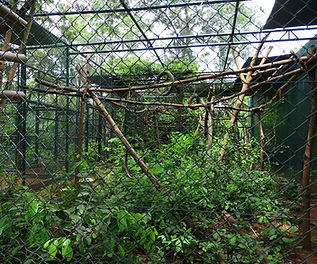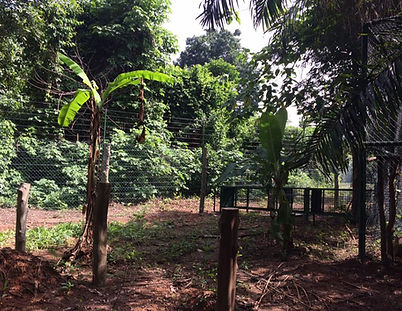






Ex-situ Captive
Breeding Programmes
About
The Wildlife Division within Ghana Forestry Commission maintains the two main zoos in Ghana. West African Primate Conservation Action (WAPCA) works with both zoos to assist with staff training and to implement and monitor the captive breeding, welfare and husbandry of the captive primates.
Accra Zoo
Accra Zoological Gardens (click to see map) is located in Ghana’s capital city, within the only remaining forest belt of the urban area, known as the Achimota Forest, proposed to be upgraded into an eco-park under ongoing plans. In 2005, West African Primate Conservation Action (WAPCA) constructed an Endangered Primate Breeding Centre (EPBC) on the zoo grounds. This facility is managed by WAPCA in close collaboration with the Wildlife Division and the Manager of Accra Zoo, Mr Paul Addah.
Mr Addah and the entire Accra Zoo staff have been actively involved in the confiscation and rescue of orphaned monkeys, particularly the Endangered white-naped mangabey and the Critically Endangered Roloway monkey. The orphaned monkeys at the EPBC have been incorporated into the European Association of Zoos and Aquaria (EAZA) Ex-situ Programme (EEP), through which animals are exchanged with zoos in Europe to maintain genetic diversity and ensure the long-term survival of the captive population.
Since 2014, the EPBC has doubled in size, with new enclosures that are larger and taller. In 2018, the original enclosures were refurbished and further increased in height.






Kumasi Zoo
Kumasi Zoological Gardens (click to see map) is located in the heart of Kumasi, 250 km from Ghana’s capital, Accra, in the Ashanti Region. The zoo covers a 1.5-square-kilometre (370-acre) area between the Kejetia Bus Terminal, the old racecourse, and the Kumasi Centre for National Culture. Established in 1951 and officially opened in 1957 by the Asanteman Council, the zoo was created to conserve nature and display indigenous wildlife of Ghana.
Between the end of 2017 and early 2018, WAPCA constructed a 0.4-hectare forested enclosure within the walls of Kumasi Zoo. This enclosure allows the mangabeys to exhibit natural behaviours, with opportunities to forage on the forest floor and climb high into the canopy. In 2018, a group of seven mangabeys was transferred from the Endangered Primate Breeding Centre (EPBC) in Accra to the new enclosure. After a short period of habituation, the group entered their 0.4-hectare forested home. The group continues to be studied to understand how they adapt to a more natural environment, providing information to support any future reintroduction feasibility programme (Click here to read more).
Our main priority is maintaining high welfare standards for the primates at both sites. We have therefore implemented a daily enrichment programme and regularly design and conduct behavioural training sessions to reduce stress during veterinary procedures or enclosure moves.








